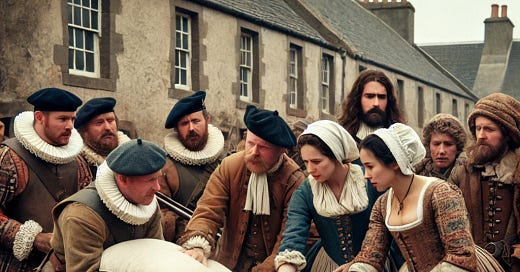The Strange Tale of Culross’ Stolen Feather Beds
In the mid-17th century, during the turbulent years of Oliver Cromwell’s rule over Scotland, the small burgh of Culross found itself entangled in an unusual and frustrating ordeal. It was not war, famine, or political strife that disturbed the townspeople most—but rather, the sudden and forceful requisition of their feather beds. This bizarre episode, recorded in the burgh minutes of 1653–1654, highlights the struggles of ordinary Scots under military occupation and offers a fascinating glimpse into daily life in a time of upheaval.
A Town’s Unexpected Christmas Gift
On December 26, 1653, just one day after Christmas, a group of English soldiers from the garrison at Castle Campbell arrived in Culross with an unexpected demand. Acting on orders from Colonel Reid, the governor of Stirling, they required 22 feather beds, 22 bolsters, 44 pillows, 44 pairs of sheets, 44 pairs of blankets, and 22 bed coverings—all for the comfort of the occupying troops. The request was not a suggestion; it was an outright requisition, meaning the townspeople had no choice but to comply.
Culross, like the rest of Scotland, was still reeling from the effects of the Civil War. Cromwell had emerged victorious, defeating the Royalist forces and establishing firm control over the nation. His troops were stationed throughout Scotland to enforce his rule, and their presence was a heavy financial burden on local communities. The demand for feather beds was particularly galling. The townspeople, already struggling with taxes and forced contributions, were now expected to give up their most prized household items to ensure the soldiers’ comfort.
A Reluctant Compliance and a Bureaucratic Nightmare
The town council, realizing they had little room for negotiation, devised a plan to distribute the burden fairly among the residents. They decided that for every £3 Scots of tax assessments, a household would be responsible for providing one bed with all the required furnishings. The names of those who were forced to contribute were recorded, and the beds were promptly gathered for transport to Castle Campbell.
But the ordeal was far from over. A week later, on January 2, 1654, the council dispatched a representative to Perth to formally protest the requisition and to ensure that Culross was properly credited for the loss of their property. Another town official was sent to Castle Campbell itself, hoping to obtain a receipt for the beds—proof that the town had fulfilled its obligation.
Unfortunately, bureaucracy and military arrogance proved formidable obstacles. The officer in charge at Castle Campbell refused to issue a receipt, claiming that the beds had arrived late and that Culross still owed money to the garrison. Desperate to resolve the matter, the council sent yet another envoy, who managed to secure the receipt—but only after paying 15 shillings sterling in "smart money" (a hefty sum at the time) to satisfy the soldiers’ demands.
The Long Road to Recovery
Even with a receipt in hand, the town’s troubles were not over. The council felt that the burden of supplying the beds should not fall solely on the burgh residents but should be shared with landowners in the surrounding parish. A lengthy dispute followed as the council tried to reclaim compensation from those beyond the town’s boundaries. By January 31, 1654, two more commissioners were sent to Stirling to continue negotiations over the beds.
The issue dragged on for months, creating tension between Culross and both the military authorities and neighboring landowners. Finally, in October 1654, another attempt was made to recover the lost beds. The governor of Leith, where some of the requisitioned furniture had reportedly ended up, was petitioned to return the items. Meanwhile, the town faced additional demands from troops stationed at Garvie, further complicating their financial and logistical burdens.
A Symbol of Struggle in Cromwell’s Scotland
This seemingly absurd episode—where a small Scottish town spent nearly a year fighting for the return of their feather beds—highlights the hardships faced by communities under military rule. The people of Culross were not alone in their struggles. Across Scotland, towns were forced to provide food, lodging, and supplies for Cromwell’s troops, often with little or no compensation.
For the residents of Culross, the feather beds became more than just household furnishings; they were symbols of their town’s resilience and resistance against an occupying force. Though they may never have fully recovered what was taken from them, their efforts to push back against unfair demands reflected the broader Scottish sentiment of defiance in the face of foreign control.
And so, this strange tale of stolen feather beds remains one of the many forgotten yet telling stories of everyday life in 17th-century Scotland—a time when even the simplest of comforts could become the center of a town’s greatest struggle.





